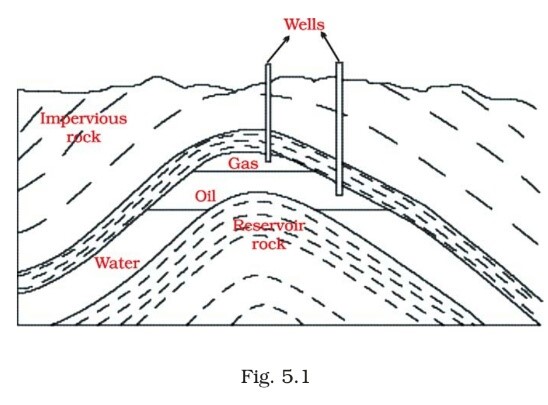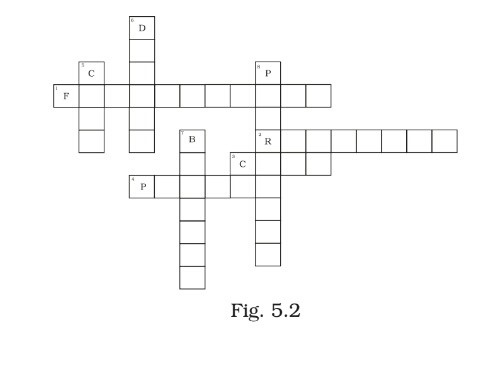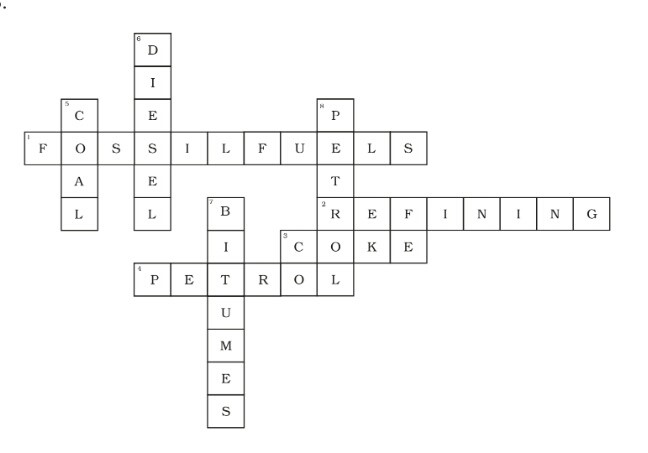Science
(www.olympiadsuccess.com)
Chapter 5: Coal and Petroleum
Class: VIII
Exemplar Solutions
Multiple Choice Questions
Question 1. Various materials which are obtained from nature are called natural resources. Which of the following is not a natural resource?
(a) minerals (c) soil
(b) water (d) plastic
Answer 1. (d)
.
Question 2. Air is a natural resource and cannot be exhausted by human activities. It is known as inexhaustible natural resource. Which of the following is another inexhaustible natural resource?
(a) coal (c) sun-light
(b) petroleum (d) minerals
Answer 2. (c)
Question 3. Which of the following is a pair of exhaustible natural resources.
(a) coal and soil (c) water and petroleum
(b) air and sun-light (d) wild life and minerals
Answer 3. (d)
Question 4. Coal is processed in industries to get some useful products. Which of the following is not obtained from coal?
(a) coke (c) coal gas
(b) coal tar (d) CNG
Answer 4. (d)
Question 5. Exhaustible natural resources are:
(a) unlimited in quantity.
(b) not dependent on nature.
(c) limited in quantity.
(d) not exhausted by human activities.
Answer 5. (c)
Question 6. Fossil fuels are obtained from:
(a) remains of non-living materials.
(b) dead remains of birds only.
(c) dead remains of insects only.
(d) dead remains of living organisms.
Answer 6. (d)
Question 7. Coal is formed from the remains of
(a) vegetation only (c) both vegetation and animals
(b) animals only (d) neither vegetation nor animals
Answer 7. (a)
Question 8. Which substance is formed by the carbonisation of dead vegetation?
(a) coal (c) coal gas
(b) coke (d) coal tar
Answer 8. (a)
Question 9. Naphthalene balls are obtained from coal tar and are used as
(a) mosquito repellent (c) moth repellant
(b) honey bee repellent (d) snake repellant
Answer 9. (c)
Question 10. Which of the following is not a constituent of petroleum?
(a) paraffin wax (c) petrol
(b) lubricating oil (d) coke
Answer 10. (d)
Question 11. Petroleum was formed from organisms:
(a) living on the land (c) living in the sea
(b) living on the plants (d) living on the rocks
Answer 11. (c)
Question 12. Choose the correct statement from the following:
(a) It is difficult to transport natural gas through pipes.
(b) The disadvantage of natural gas is that it can not be used directly for burning in homes.
(c) Natural gas is stored under high pressure as compressed natural gas.
(d) Natural gas cannot be used for power generation.
Answer 12. (c)
VERY SHORT ANSWER QUESTIONS
Question 13. You are provided with a mixture of petroleum and water. Can you suggest a method to separate the two?
Answer 13. Decantation
Question 14. What does CNG stand for and why is it considered to be a better fuel than petrol?
Answer 14. CNG stands for Compressed Natural Gas. It is considered to be a better fuel because it is less polluting.
Question 15. Name the petroleum product used as fuel for stoves, lamps and jet aircrafts.
Answer 15. Kerosene is used as fuel for stoves, lamps and jet aircrafts.
Question 16. Fill in the blanks in the following sentences.
(a) Coal is one of the ________ used to cook food.
(b) When heated in air, coal burns and produces mainly ________ gas.
(c) Coal tar is a black, thick ________ with an ________ smell.
(d) Petroleum, ________ and ________ are fossil fuels.
(e) Forests and coal are ________ natural resources.
Answer 16. (a) fuels (d) coal, natural gas
(b) carbon dioxide (e) exhaustible
(c) liquid, unpleasant
Question 17. The underlined words in the following sentences have been jumbled up. Write them in their correct form.
(a) Loca is obtained from mines.
(b) Umpetlore is a fossil fuel.
(c) Rineryfe is a place where various fractions of peroleum are separated.
(d) Keenrose is a fuel used in jet crafts.
(e) Nutsgilh is an example of inexhaustible natural resources.
Answer 17. (a) coal (b) petroleum (c) refinery (d) kerosene (e) sunlight
Question 18. Fill in the blanks.
(a) The slow process of conversion of dead vegetation into coal is called__________.
(b) Coal and petroleum are formed from the dead remains of organisms and are known as __________.
(c) The black thick liquid with __________ smell is known as coal tar.
(d) During the processing of coal to get coke, coal tar and __________ are also obtained.
(e) The process of separating the various constituents of petroleum is known as __________.
(f) Excessive burning of fossil fuels is a major cause of __________.
Answer 18. (a) carbonisation, (b) fossil fuels, (c) unpleasant,
(d) coal gas, (e) refining, (f) air pollution.
Question 19. Write True/False against the following statements.
(a) Oxygen in air is an exhaustible natural resource.
(b) Resources which are present in unlimited quantity in nature are called exhaustible natural resources.
(c) Wildlife is an exhaustible natural resources.
(d) Under high temperature and pressure, dead plants get slowly converted to coal.
(e) CNG is less polluting fuel than petrol and diesel.
Answer 19. (a) False, (b) False, (c) True, (d) True, (e) True.
SHORT ANSWER QUESTIONS
Question 20. Sunlight and air are inexhaustible natural resources. Comment.
Answer 20. These resources are present in unlimited quantity in nature and are not likely to be exhausted by human activities.
Question 21. Some natural resources are given in a box. Classify them into the exhaustible and inexhaustible natural resources.
air, coal, natural gas, sunlight, petroleum, minerals, forests, oxygen.
Answer 21.
Exhaustible natural resources are coal, natural gas, petroleum, minerals, forests.
Inexhaustible natural resources are air, sunlight, oxygen.
Question 22. Write two important uses of coke.
Answer 22. . It is used for extraction of many metals and also for the manufacture of steel.
Question 23. Write the characteristics and some important uses of coal.
Answer 23. Coal is black in colour and hard as stone. It is one of the fuels used to cook food. Earlier it was used in railway engines to produce steam to run the engine. It is used as fuel in thermal power plants to produce electricity and in various other industries.
Question 24. Look at Fig. 5.1 where petroleum and natural gas deposits are shown. Why do we find oil layer above water layer?

Answer 24. Hint: Oil is lighter than water hence floats over it.
Question 25. Fill in the blanks and complete the story.
About 300 million years ago the earth had dense ________ in low lying wetland areas. Due to natural processes, like ______, these forests got burried under the ________. As more ________ deposited over them, they were compressed. The ________ also rose as they sank deeper and deeper. Under high ________ and high ________, dead plants got slowly converted into coal.
Answer 25. forests, floods, soil, soil, temperature, pressure, temperature.
Question 26. Match the items given in Column I with the items of Column II.

Answer 26. (a)–(iii), (b)–(iv), (c)–(i), (d)–(ii)
Long Answer Questions
Question 27. Name the products obtained and their uses when coal is processed in industry.
Answer 27. Coal when processed in industry gives coke, coal tar and coal gas.
Coke is used in the manufacture of steel and in extraction of many metals.
Coal tar is used as starting material for manufacturing various sustances such as synthetic dyes, drugs, explosives, perfumes, paints etc.
Coal gas is used as fuel.
Question 28. We say fossil fuels will last only for a few hundred years. Comment.
Answer 28. It takes a very long time for the formation of fossil fuels. It also requires specific conditions and it doesn’t happen quite often. Therefore, their limited stock will last only for a few hundred years.
Question 29. We read in newspapers that burning of fuels is a major cause of global warming. Explain why.
Answer 29. Hint: It is related to global warming due to formation of carbon dioxide and some other gases.
Question 30. While driving what are the tips we must follow to save petrol/ diesel/natural gas?
Answer 30.
Questuion 31. Imagine that all the exhaustible natural resources are exhausted by human activities. Do you think survival of living beings would be possible.? If yes, why?, If not, why not?
Answer 31. This is an open ended question. Let children imagine and write.
Question 32. Why petrol is exhaustible natural resource, whereas sunlight is not? Explain.
Answer 32. Hint: Sunlight is present in unlimited quantity in nature whereas it takes millions of years to form petrol from dead remains of organisms.
Questuion 33. Write some important uses of the various constituents of petroleum.
Answer 33.
Question 34. Coal reserves are said to be enough to last for another hundred years. Do you think we need to worry in such case? Why or why not?
Answer 34. Open ended question. Let children write their views.
Question 35. What steps would you suggest for the judicious use of fossil fuels?
Answer 35. Open ended questions. Let children write their ideas
Question 36. Complete the crossword Fig. 5.2 with the help of the clues.

Across
Down
Answer 36.

Yearlong program for Olympiads preparation & to build necessary skills for future.
Explore More
Time to mark your calendar with the upcoming Olympiads exam schedule.
Explore More
Take your Olympiad preparation to next-level by taking LIVE Classes.
Explore More
Assess your performance by taking topic-wise and full length mock tests.
Explore More
Online tuitions for international compeitions like SASMO, SEAMO, etc for Grades 1-11.
Explore More